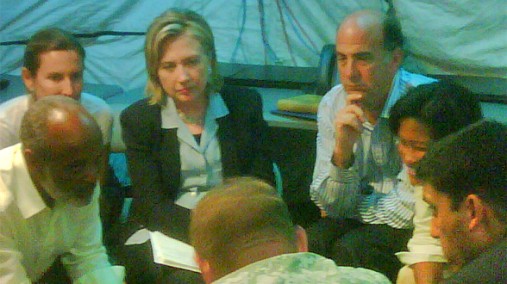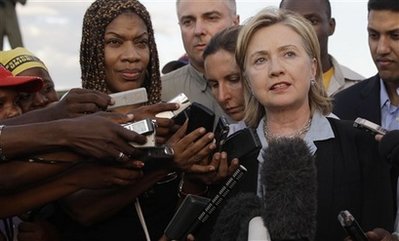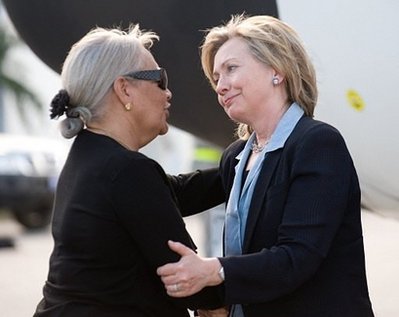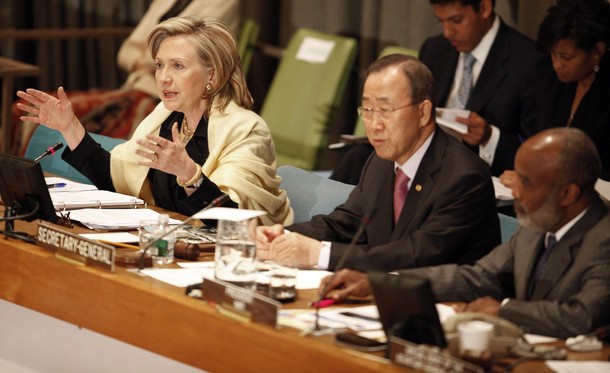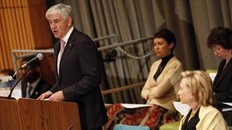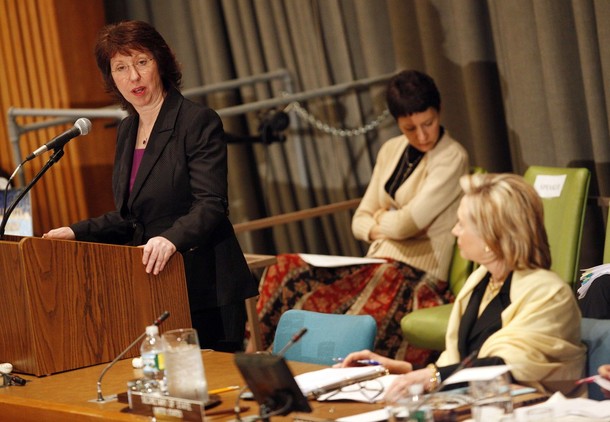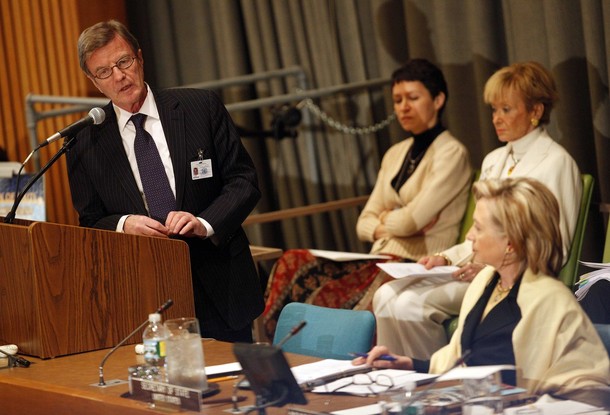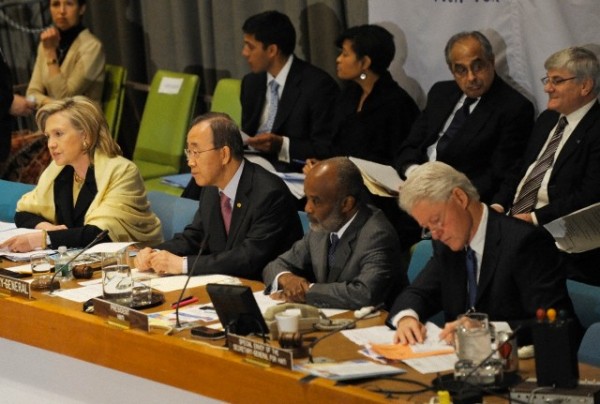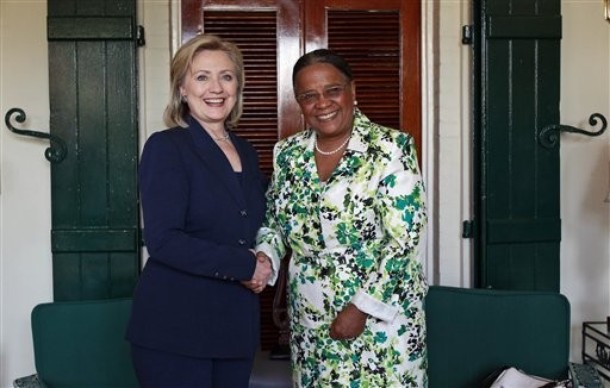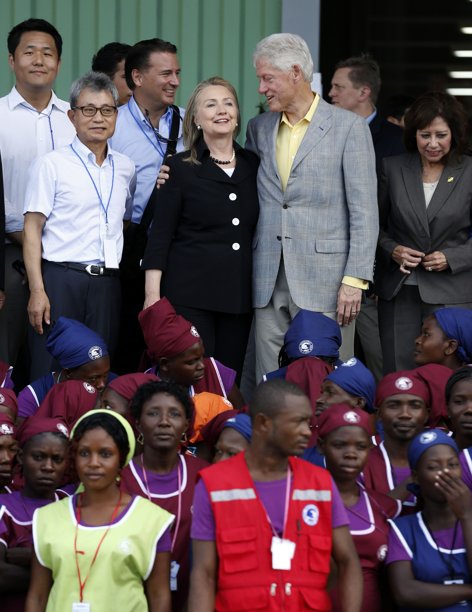SECRETARY CLINTON: Well, good morning. It’s a great personal
pleasure for me to have this opportunity to welcome the Prime Minister
of Haiti. Prime Minister Lamothe is someone who comes to this job on
behalf of his country with a lot of private sector experience, a lot of
commitment. And we are delighted to be working with you.
As some of you know, when I came into office as Secretary, I made
Haiti a foreign policy priority and committed to working to change the
way that we partnered with Haiti, moving from working in Haiti to
working with Haiti. And in the 30 months – actually, more than that,
because we started before the earthquake. And then once the earthquake
happened, we scrambled to make sure we were being a good partner in
helping Haiti recover from such devastation, but at the same time,
working with them to help build a firm foundation for more prosperity
and stability.
So today, the Prime Minister and I had a chance to take stock of what
we have accomplished together, along with Haiti’s other international
supporters, and to discuss the way forward. Haiti is working very hard
to overcome extreme poverty, very, very high unemployment, the
devastating natural disaster, and so much more. Some of these challenges
existed before the earthquake, but they were exacerbated by the
disaster. And while we want to highlight the progress we’ve made
together, we cannot ignore what more lies ahead in terms of the
challenges facing Haiti and its leaders. We have focused our work in
four critical areas: agriculture, healthcare, infrastructure, and the
rule of law.
Through our Feed the Future Initiative, we’ve helped nearly 10,000
farmers access improved seeds, fertilizer, and introduce new techniques
for better productivity. And for those farmers, production has already
increased. Rice yields have more than doubled; corn yields have more
than quadrupled. Our goal is to help 100,000 farmers over the next few
years.
Working with Haiti and its partners in the health sector, we have had
to work hard and have succeeded in greatly reducing the fatality rate
of the cholera epidemic from 9 percent to just over 1 percent. But we
know that the only way to stop cholera long term is through improved
water and sanitation. So we’re working with the Inter-American
Development Bank and other donors on water, sanitation, and hygiene
programs. And we’re working to upgrade health clinics in Haiti and to
renovate the general hospital in Port-au-Prince in partnership with
France.
In the infrastructure sector, we’ve removed more than two million
cubic meters of rubble. We’ve worked with the Haitian Government to help
return more than one million internally displaced persons to temporary
shelters and safer homes. We’re also working hard with our Haitian
partners to build up Haiti’s economy, building infrastructure that will
expand and diversify the economic base.
In northern Haiti, the new Caracol Industrial Park is a landmark
project that captures an integrated, sustainable approach to economic
development. The park is drawing companies and will create more than
20,000 new jobs for Haitians. The first factory in the park has already
begun operations; a second tenant has just signed up. Construction is
underway on a new settlement in the area with more than 1,200 homes
designed to withstand hurricanes and earthquakes, each with electricity,
potable water, and flush sanitation.
And finally, in the rule of law sector the international community
has provided critical support during Haiti’s elections for president and
parliament – and we have the president of the senate here with us today
– to ensure that the votes of the people of Haiti are counted.
President Martelly and the Prime Minister and the parliament are
demonstrating real leadership in making these reforms. The government
has successfully stood up the superior judiciary council, making this
government the first with all three branches functioning since 1987.
And today, the Prime Minister and I discussed the importance of the
upcoming elections for local officials and the senate. And we talked
about the continued need for police reform, border security, judicial
reform, and the other important elements of stability that Haiti is
committed to. Haitians have been in the lead at each step. This is
something I believe in very strongly, that in the 21
st
century, country ownership, country priorities, country agenda setting,
is absolutely essential. The United States can be helpful, but what’s
really important is building the capacity of the Haitian Government and
the Haitian society so they can have the means and the experience and
the expertise to solve their own problems.
As I said to the Prime Minister, as I’ve said many times, Haitians
are among the most creative, most vital, most hardworking people in the
world. We have benefited so greatly from Haitian Americans in our
country as many other countries have as well. Haiti has also,
unfortunately, been the leading country in the world for brain drain.
More Haitian college graduates have left Haiti, per capita, than any
other country in the world. When you think of the talent that Haiti has
produced that benefits us and others, what we want to do is make it
possible for any bright, young, ambitious Haitian to stay home and to
build his or her country. And we are excited by the progress we’re
making. We are clear-eyed about the challenges we face, but we look
forward to a future where every single Haitian has a chance to live up
to his or her God-given potential in the country they are from and love.
So Prime Minister, personally, I want to thank you for what you are doing with your leadership to bring that day closer.
PRIME MINISTER LAMOTHE: Thank you very much, Madam Secretary.
And I want to thank you for your leadership, the leadership that you’ve
shown into promoting Haiti, and not only for the leadership, but for the
love also that you’ve shown toward the Haitian people, the compassion
that the United States is showing toward Haiti, and the support that the
U.S. is giving to Haiti is greatly appreciated.
My office, my – the Prime Minister’s office, the President is deeply
touched also by the appreciation. The respect that you give to Haitians
is very important to us. The respect that we get from you, from your
government, will go a long way and has. Of course, we’re celebrating 150
years of relationship when President Abraham Lincoln recognized the
independence of Haiti and Haitians, and we just celebrated on the 12
th of July, and we’re very happy about that and very proud of that.
The U.S. is doing a lot of good things in Haiti. The Northern
Industrial Park is a development model that we want to replicate and
that we want to support. The unemployment rate, as you well said, Madam
Secretary, is at 52 percent. Fifty-two percent of the Haitian people are
looking for jobs and are not finding the opportunities for the job, and
when Haitians are given the opportunities, they succeed. The Northern
Industrial Park will give, as you said, 20,000 jobs, direct jobs. But
out of the direct jobs in Haiti, you get a (inaudible) of 10 to 20
percent. That means over 1 to 200,000 people will benefit from that
park. That’s why it’s important to not only promote the park, but seek
additional tenants and improve the capacity of that park to make it a
big success. And once it’s inaugurated in October – and we’re looking
forward to your visit – we assure that the rest of the world will see
what us Haitians see, which is a success story.
We have – we’ve committed – the Haitian Government – the new Haitian
Government is committed to improving the fight against corruption, which
we’ve made as our number one priority – education, fight against
extreme poverty. Too many Haitians are living in difficult circumstances
with less than a dollar a day. We’re thinking about them, and we’re
coming up with programs – social protection programs to assist them in
the plight of a better life.
So I want to take this opportunity and the platform to thank also
President Clinton for all the dedication and hard work and visits, and
tripping in helicopters into the different parts to showcase what Haiti
has that’s good, and to show that Haiti can be in the headlines for good
things, not only bad things. And President Clinton has been a champion
for that, and you, Madam Secretary, have also been on the forefront of
promoting Haiti, and we thank you for that.
MS. NULAND: We’ll take three today. We’ll start with CBS, Cami McCormick.
QUESTION: Good morning, Madam Secretary. I wanted to ask you
about the violence today in Aleppo in Syria. It’s been described as
combat, fierce fighting. This no longer seems to be just a case of the
regime oppressing civilians. It seems to be all-out war. What
realistically can be done at this moment to stop the fighting and bring
about a political solution? Is that even possible right now considering
the conditions there?
SECRETARY CLINTON: Well, first, we are well aware that the
pace of events is accelerating inside Syria. Over the weekend, one of
the opposition’s military leaders announced that they would be engaged
in all out – an all-out effort to take over Aleppo, which, as you know,
is the second largest city in Syria.
So what we are trying to do with our likeminded friends is to
continue pressuring the regime, continue pushing for humanitarian
relief, because the flow of refugees is increasing. We obviously would
have preferred doing all of this under a UN umbrella. Unfortunately,
those who are still supporting Assad undermined Security Council action.
Russia and China exercised their third double veto. And so we are
working outside of the UN Security Council to send a clear message of
support for the opposition. We are, as I’ve announced before, providing
nonlethal assistance. We have every reason to believe this will be
important in terms of communication, principally, but also medical
support. We are also sending a very clear message about the
international community’s rejection of any effort by the Assad regime to
use chemical weapons or other weapons of mass destruction.
And we have to work closely with the opposition because more and more
territory is being taken, and it will eventually result in a safe haven
inside Syria, which will then provide a base for further actions by the
opposition. And so the opposition has to be prepared. They have to
start working on interim governing entities. They have to commit to
protecting the rights of all Syrians – every group of Syrians. They have
to set up humanitarian response efforts that we can also support.
They’ve got to safeguard the chemical and biological weapons that we
know the Syrian regime has.
And there’s a lot to be done, so we’re working across many of these
important pillars of a transition that is inevitable. It would be better
if it happened sooner – both because fewer people would die or be
injured, but also because it would perhaps prevent sectarian retribution
and other kinds of breakdown in stability.
So I think it’s important to look at these day-after issues, and
that’s what we are trying to do. And we want to see a democratic,
peaceful, pluralistic Syria and have that country demonstrate a
commitment to that kind of future, but we know we have some hard times
ahead of us.
MS. NULAND: Next question from the Haitian side. Flory Anne Isaac, TNH.
QUESTION: (Via interpreter) Good morning, Madam Secretary, Mr.
Prime Minister. My question is mainly directed to my fellow citizens.
My question is regarding a very important issue for them, namely the
temporary protection status – TPS. I was wondering if you have any good
news to announce in that regard. Do you have any good news to announce
to my fellow citizens on this measure taken by the Obama Administration?
And secondly, Madam Secretary, I have question for you. You have
visited more than 100 countries in the course of your time as Secretary
of State. Does that make you a new person, and what lessons have you
drawn from all that travel?
PRIME MINISTER LAMOTHE: In that – the TP --
SECRETARY CLINTON: The TPS. Yeah, yeah.
PRIME MINISTER LAMOTHE: The TPS.
SECRETARY CLINTON: As you know, we granted TPS; we are
watching this very closely. It is a matter that the Obama Administration
takes very seriously. There’s no new news to report, but there is a
very vigorous effort that we are engaged in to ensure that the Haitian
people are not put at a disadvantage going forward. But that is still in
the process of being worked through. As you know, I don’t get the final
decision on this. That’s elsewhere in our government. But we are
well-aware of the burdens that any other decision at this time would
pose.
With respect to your question, which is really an intriguing one that
I haven’t been able to think enough about, I have been very honored to
represent the United States now in so many places around the world. And
what I see and what I hope to convey is how in many ways there is an
opportunity for progress for people that has not been readily available
before. We know so much more about what works, and we have learned many
lessons.
I was telling the Prime Minister that there are countries that have
been through terrible experiences – Rwanda, for example – that are now
making good domestic decisions to help their people. And the fight
against corruption is a universal fight. The fight for greater
employment and economic opportunity is a universal fight. The fight to
improve government and services and to have the revenues obtained in an
honest way is a universal challenge.
So much of what Haiti is doing now I know can work, because I have
seen that. And as the Prime Minister kindly said, my husband and I have a
very big place in our hearts for Haiti and we want to see Haiti
succeed. But what it comes down to is good leadership and responsible
citizenship. First, you have to have good leaders who are leading in the
right way, who represent the will of their people, who are prepared to
make difficult decisions. But then you also have to have responsible
citizens who understand change is hard – it does not happen overnight –
and who are prepared to do their part.
So I’ve seen successes and failures, and I am very optimistic that Haiti is in the success category.
Do you want to add anything, Prime Minister?
PRIME MINISTER LAMOTHE: We are committed to doing the right
thing. Haiti’s government in the past have made a lot of bad decisions
as well about governance that created a situation where Haiti depends on
international assistance for just about everything. Today, we’re making
decisions away from that. We are building our capacity to collect our
own revenues, increase the tax revenues, increase the custom duty
revenue, decrease spending on energy subsidies to increase, again,
government revenues. So we are focusing on the revenue side, and the
government is putting together a comprehensive energy policy that will
give electricity throughout the island and distribution of the
electricity to everybody, just like what happened in the phone system,
where 20 years ago it was very difficult to get a telephone line. Today,
over 5 million Haitians have a phone. Businesses have increased, and
doing business has been easier because of that. Today is the same case
for the energy. We are dedicated and we are committed to providing
electricity all over the country and prepaid meters so that everybody
has access to the electricity.
And of course, we are thinking of the voiceless, those that don’t
have the opportunity to ever speak, the most vulnerable ones, in a very
aggressive anti-poverty strategy that currently we have a program that’s
called Dear Little Mother that affects 100,000 – that positively
impacts 100,000 moms in Haiti in a conditional cash transfer, so they
get a cash transfer every month so long as their child is and remains in
school. And after six months, the child graduates but the child has to
be vaccinated to stay in the program. So it (inaudible) good behavior
and child attendance in school.
We are also working on social protection programs like school
canteens. We are trying to increase working with AID to increase the
number of children that are getting a meal every day. So basic policies
but that go a long way into assisting those who need it the most.
MS. NULAND: Last one today. Arshad Mohammed from Reuters.
QUESTION: Secretary Clinton, another question on Syria. In
your remarks at the Holocaust Museum this morning, you said that the
Administration is now doing more to assist the opposition. You mentioned
just now communications and medical assistance. What exactly
additionally are you doing? Does it include the provision of
intelligence? Does it include helping them mount attacks or defend
themselves?
Secondly, you said that it would be unfortunate if Assad and his
circle were to conclude that this is an existential struggle. From the
outside, it certainly does look like a life-and-death struggle. What
exactly did you mean by that? I suppose one possibility might be that
you want to send a signal to the Sunni majority that if they prevail,
they should not engage in sectarian violence afterwards; there shouldn’t
be score settling. I suppose another possibility is you’re trying to
signal to Assad and his inner circle there’s still a way out of this for
them. But what exactly were you thinking of with that remark?
SECRETARY CLINTON: Well, those are two good options, Arshad. I
would associate myself with your comments. I think that we do believe
that it is not too late for the Assad regime to commence with planning
for a transition, to find a way that ends the violence by beginning the
kind of serious discussions that have not occurred to date. We think
it’s very important that the opposition fighters, as they get better
organized and expand their presence more broadly, send a message that
this is for the benefit of all Syrians, not for any group, not engage in
any reprisals and retribution that could lead to even greater violence
than currently is taking place.
We think it’s important to better coordinate the work that is going
on in the region, especially with the increasing refugee flows, and we
are intently focused on that, working with Jordan and Lebanon, Turkey,
and Iraq; making it clear to all of those who are helping to see an end
to this conflict that everybody needs to express the same views about
what we want to see next; that no one should be seeking advantage to the
detriment of anyone else inside of Syria.
So when I say that – we obviously spent a good amount of time working
to find a way that Russia and China could move forward with us in the
Security Council. That is on the far backburner right now. So when I say
we are doing more, we have moved our efforts into other arenas and with
other partners. We still would like to see the Security Council act
because we think it would be to the – certainly, to the benefit of the
people of Syria, but also to the credit of the Security Council. But if
that’s not in the cards for the foreseeable future, then we will
intensify our efforts with the Arab League, with the neighbors, with the
Friends of Syria, with the justice and accountability unit we’re
starting, with the UN Commission of Inquiry, with the Sanctions Working
Group, with all the other elements that are not affected by the failure
to act in the Security Council, and that’s what we’re doing.
QUESTION: Does that include intelligence or military assistance of any sort, even if nonlethal?
SECRETARY CLINTON: Well, we are certainly providing
communications that we know is going to people within Syria so that they
can be better organized to protect themselves against the continuing
assault of their own government.
Thank you all.


